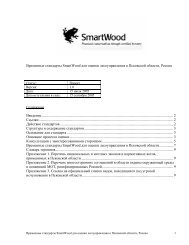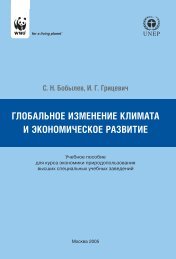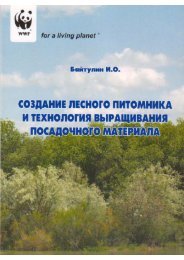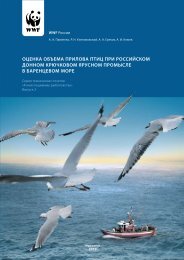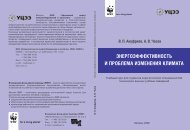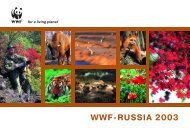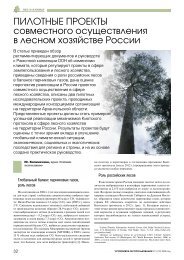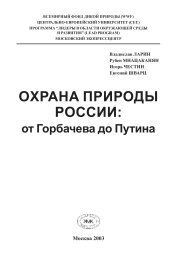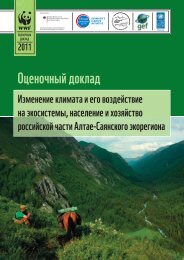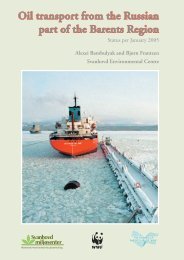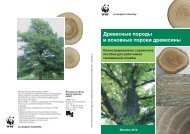Russia-China Timber Trade_cover.jpg
Russia-China Timber Trade_cover.jpg
Russia-China Timber Trade_cover.jpg
You also want an ePaper? Increase the reach of your titles
YUMPU automatically turns print PDFs into web optimized ePapers that Google loves.
Illegal logging exists mainly due to weak state control in the forestry sector. However, responsibility also restson the shoulders of logging and trading companies. In private conversations with managers of <strong>Russia</strong>n exportingcompanies, timber is often paid for in cash. Under the control of specialized intermediates, this timber isthen sold to legal timber exporters. WWF believes that all enterprises in the forest sector have to make everyeffort to provide transparent information on the timber’s origin (see Annex 3). Profits made on illegal timber arelaundered during the transport and export of timber. These activities are often closely connected with otherillegal activities, such as:• mislabeling timber quality to avoid taxation (e.g. sawnwood declared as pulpwood);• producing double invoices and agreements to avoid taxation: one set has the real price for customs officials,while the other has much lower prices indicated for tax officials;• unregistered trade in foreign currency;• understating the cost and volume of exported timber in ‘official’ agreements to hide profits. The differencecould be paid by a client in cash or though a secret bank account;• obtaining permission to transport timber via ‘one-day’ firms or exporting using false papers;• understating the volumes of exported products by bribing customs officials.Illegal logging is a clear barrier to sustainable forest management. Indeed, Illegal trade threatens the reputationand very existence of legal trade. International experts stress the necessity to cease illegal logging as it underminesthe trust of consumers in the legality and sustainability of products they are paying for. See below fordefinitions of illegal logging.Illegal Logging and Forest Crime – WWF definition:“Illegal logging occurs when timber is harvested, transported, processed, bought or sold in violation orcircumvention of national or sub-national laws.”WWF Position Paper on Illegal Logging and Forest Crime, April 2002Illegal Logging – decision of the Supreme Court of the <strong>Russia</strong>n Federation:“Illegal logging is harvesting of trees, shrubs, and lianas without a felling license/order; or logging with afelling licence/order issued in violation of the standing felling rules; as well as logging in prohibited areas,or outside the boundaries of permitted regions; logging in excess of the allowed volume; logging ofprohibited species or trees, shrubs, and lianas prohibited for harvesting…”Ruling of the Plenum of the Supreme Court of the <strong>Russia</strong>n Federation, “On Court Application Practice ofLaws Concerning Liability for Environmental Offences,” No. 14 of 5.11.98.Ecological problemsIllegal logging has severe impacts, both direct and indirect, on the environment. Some issues associated withthis include:1) No royalties, taxes, or other premiums are paid by logging companies for illegally harvested wood. Therefore,forest management units do not obtain sufficient funds to properly manage forests. The financial shortfallto implement forest management measures is 1.5 billion roubles annually. The Chamber of the <strong>Russia</strong>n Federationnoted in its report in 2000, “Efficiency of Forest Resource Use of the <strong>Russia</strong>n Federation,” that control ofincomes generated from forest use was very ineffective. As of January 1, 2001, forest users had evaded 1.3million roubles in fees. In <strong>Russia</strong>, nearly 20 million out of 80 million ha of exploitable forest are not properlyreforested. As a result, structure of the forests degrades, high quality timber stands decrease and low qualitystands increase.2) Illegal logging results in degradation of the most ecologically valuable stands. In Eastern Siberia and theRFE, these are intact forests, which are essential for the maintenance of ecosystem functions, the conservationof rare species, the protection of biodiversity, etc.3) <strong>Timber</strong> poachers take only commercially valuable timber, leaving unwanted wood on site, which is fuel forforest fires and pests.27



